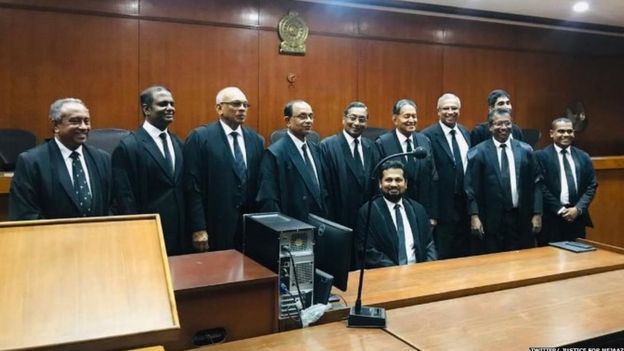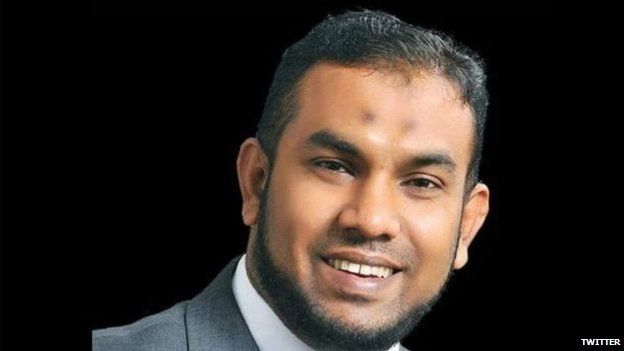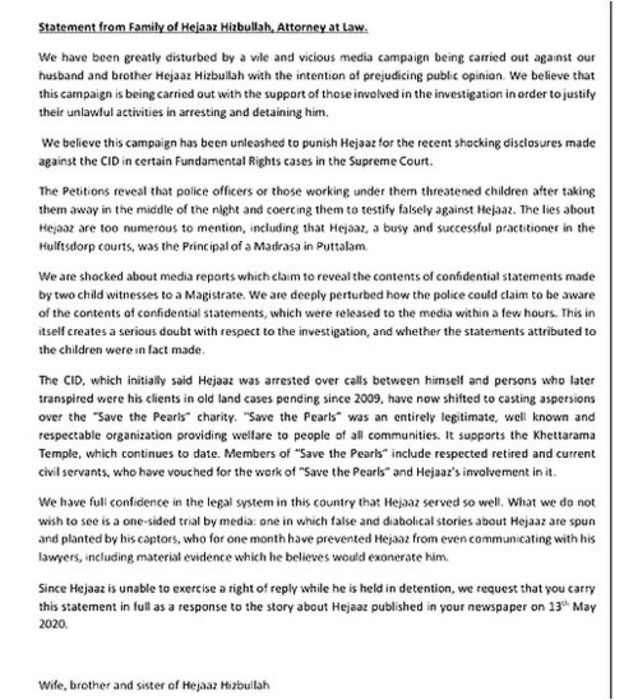The dreaded Prevention of Terrorism (Temporary Provisions) Act No. 48 of 1979 (PTA) has been in public discussion ever since it was enacted. It was initially introduced in Parliament as ‘Temporary Provisions’ vide Section 29 of the Act which read:
“Section 29 of the principal enactment is hereby repealed.”
Widely condemned as an equivalent of Draco’s law, this statute was passed under the watch of the JR Jayewardene Presidency. It was specifically designed to confer on the police wide powers relating to search, arrest and detention of suspects. United Nations and International Human Rights organisations have been campaigning for long calling the State to institute reforms to this abusive Act.
This column should not be construed as an effort or campaign supporting Hejaz or any others who had been arrested at different times since 1979.
Rule Of Law Or Rule By Law
Sri Lanka is known to be a democratic country. In keeping with that spirit, she has inter alia, judicial institutions, where it is ideally expected that the rule of law Supremes. At a High-level Meeting of the General Assembly on the Rule of Law on 19 September 2012, it reaffirmed that “human rights, the rule of law and democracy are interlinked and mutually reinforcing and that they belong to the universal and indivisible core values and principles of the United Nations.” The diktat is for world governments to ensure that accountability, equality and justice are upheld and promoted in order to protect and secure the rights of citizens. These comprise the utilitarian aspects of strengthening democracy.
Sri Lanka has showcased its idea of the rule of law in Chapter III of the constitution, dedicating it to Fundamental Rights. The universal norm is that no law can supersede the Constitution of the country. It is said, ‘The judiciary, which applies the law to individual cases, acts as the guardian of the rule of law. Thus, the need for an independent and properly functioning judiciary becomes a prerequisite for the rule of law which requires a just legal system, the right to a fair hearing and access to justice.’
Consequence Of Rule By Law
Statutes, Rules and Regulations, executive actions and policies of a government must be regimented to function under the rule of law. Where there is unconstrained substantive or procedural abuse disregarding law such exploits cease to be governed by this precept. In these instances, the doctrine of rule of law dissipates giving way to the repressive and cruel rule by law. The beginning of abuse is from this point.
In the background of the aforesaid, to quote a dictum from the British Legal Philosopher, H.L.A. Hart is appropriate. It illustrates the timeless limbo of persons like Hejaaz Hizbullah and the many others who have been incarcerated under the dreaded PTA, at different times:
“A paralysed man watching a thief’s hand close over his gold watch is properly said to have a right to retain it as against the thief, though he has neither expectation nor power in any ordinary sense of these words.” (Hart, Essays in Jurisprudence and Philosophy, 1983).
Hart using the analogy of a paralytic draws attention to the condition of a person who has a right but cannot expect to assert that right and, the same person having no power to proclaim his right. How many such ‘paralysed’ persons are languishing in custody? The distressed family members are asking where are the democratic minded citizens who are supposed to act to strengthen equity and justice?
Communication, A Basic Right
This column does not intend to traverse the gamut of the right to communicate. It would suffice to suggest a few markers to get an understanding.
Article 19 of the Universal Declaration of Human Rights:
“Everyone has the right to freedom of opinion and expression; this right includes freedom to hold opinions without interference and to seek, receive and impart information and ideas through any media and regardless of frontiers.” (United Nations, 1948).
Our Constitution, 14. (1) (a), states:
“Every citizen is entitled to the freedom of speech and expression including publication”.
This is a restricted right by virtue of Article 15 (7) (2) of the Constitution:
“The exercise and operation of the fundamental right declared and recognized by Article 14(1)(a) shall be subject to such restrictions as may be prescribed by law in the interests of racial and religious harmony or in relation to parliamentary privilege, contempt of court, defamation or incitement to an offence.”
It is clear as daylight that this restriction does not contemplate a situation where a detainee wants to consult with his or her Attorney.
Role of the Judiciary
It is well known, at least theoretically, that the pillars of democracy consist of the Legislature, the Executive and the Judiciary and the strict separation of their functions. The objective is to ensure proper checks and balances and to prevent the concentration of power. Due to novel developments in the political landscape, there has evolved hybrid versions of this foundation. For example, the separation of powers has significantly become diluted between the legislature and the executive. It is only the judiciary that has been able to stand alone and maintain its independence although, several attempts have been made in the past to inhibit its authority.
At the Finland’s Presidency of the Council of the European Union conference held in Helsinki in September 2019, much emphasis was placed on the protection of the rule of law with special responsibility placed on the judiciary. It resolved:
“Rule of law is the cornerstone of all democratic societies. A proper system of checks and balances maintains the separation of powers, ensures accountability and enhances resilience. In order to maintain trust in public institutions, the principles of legality, legal certainty, prohibition of arbitrariness of the executive powers, judicial independence, impartiality, and equality before the law need to be respected. The role of national and European courts is crucial for ensuring effective judicial protection.”
Animal Rights
With regard to the Rights of Animals, Mahatma Gandhi said: “The greatness of a nation and its moral progress can be judged by the way in which its animals are treated.” Interestingly, he juxtaposes the way animals are treated as a measurement of value to judge the greatness and moral progress of a nation. What characteristics of a nation can be judged based on the way humans are treated?
The rights of freedom and liberty of any person are too sacred to be sacrificed at the drop of a hat. American Jurist Ronald Dworkin argues, “If someone has a right to moral independence, this means that it is for some reason wrong for officials to act in violation of that right, even if they (correctly) believe that the community as a whole would be better off if they did.” (Lloyds Jurisprudence, 6th Edition, P. 434).
At a time when man is being silenced by man, it is strange to see and hear some people talking in the following terms, as seen in a poster with a picture of a dog:
“Animals have no voice.
They can’t ask for help.
They can’t ask for freedom.
They can’t ask for protection.
HUMANITY MUST BE THEIR VOICE.”
How confused can we be between the imperatives of treating animals and human beings? It is ironic to note that in Sri Lanka, we are excessively worried about the rights of animals than the rights of human beings.
State Of Limbo Unethical
Hejaz and many others who are under detention, most of them without the due process of law, also deserve this Voice Of Humanity. Apparently, the voice of humanity for the welfare of the humans themselves, seems pathetically lost or hypocritically ignored! Apart from the voice of humanity, it is the duty of the government to treat its subject with equality and concern.
The writer is clearly not campaigning for Hejaz or, for the others in custody under the PTA, that they are innocent. If they are found guilty by a court of law, let them be punished.The emphasis of this column is that suspects should be handled in accordance with the laid down legal procedures. Apply the rule of law and avoid rule by law. Arbitrary actions are prohibited even under international law. Sri Lanka is an unconditional signatory to many international instruments protecting equality in multiple fields. See, Right to equality: The new frontier of judicial activism, by Deepika Udagama.
The Geneva based Association for the Prevention of Torture (APT) in its monitoring guidelines on detention centers, states:
“Depriving a person of his or her liberty is a serious coercive act by the State, with inherent risks of human rights abuses. Through the loss of liberty, the detained person comes to depend almost entirely on the authorities and public officials to guarantee his or her protection, rights, and means of existence. The possibilities for persons deprived of their liberty to influence their own fate are limited, if not non-existent.”
Never Deprive
Neither does acceptance of the right of a person make that person noble nor does non-acceptance make that person ignoble. The basic rights of a person are intrinsic to his self as a person and is deep-rooted in the nucleus of his naturally endowed liberty. He should never be deprived of it by arbitrary action or the denial of justice but by the due process of the law.
 TWITTER/ JUSTICE FOR HEJAAZ
TWITTER/ JUSTICE FOR HEJAAZ
අදින් මාස කිහිපයකට පෙර ශ්රී ලංකාවේ ශ්රේෂ්ඨාධිකරණය ඉදිරියේ පැවති විභාගයකදී තරුණ නීතිඥවරයෙක් පෑ වාග් පෙළහර එහි සිටි බොහෝ දෙනාගේ සිත් ඇදගැනීමට සමත්විය.
රට පුරා මහත් ආන්දෝලනයකට ලක් වූ ඒ නඩු විභාගයේදී ඔහු මතු කළ තර්ක කෙතරම් අවධානයට ලක් වූයේ ද යත් ඔහුගේ මිතුරන් මතු නොව, අධිකරණයේ දී ඔහුගේ ප්රතිවාදීන් වූ සගයින් ද ඔහු පැසසීමට පසුබට නොවූහ.
නඩුව, ජනාධිපති මෛත්රීපාල සිරිසේන විසින් නීති විරෝධී ලෙසින් අගමැතිවරයා පදවියෙන් පහකොට පාර්ලිමේන්තුව විසුරුවා හරිනු ලැබීමට එරෙහිව පැවති මූලික අයිතිවාසිකම් පෙත්සම් පිළිබඳ විභාගයයි.
එම තරුණ නීතිඥයා පෙනී සිටියේ ජාතික මැතිවරණ කොමිසමේ සාමාජික මහාචාර්ය රත්නජීවන් හූල් ඉදිරිපත් කළ පෙත්සම වෙනුවෙනි.
ශ්රේෂ්ඨාධිකරණය ඉදිරියේ ඔහු එදා තර්ක කළ ආකාරය The Hindu පුවත්පතේ මාධ්යවේදිනී මීරා ශ්රීනිවාසන් මෙසේ වාර්තාකර තිබුණි.
එදා නීතිවේදියාගේ තර්ක පෙළහර කෙතරම් සුවිශේෂී වූයේ ද යත් නඩු විභාගය අවසානයේ පෙත්සම්කරුවන් වෙනුවෙන් පෙනී සිටි ජනාධිපති නීතිඥවරුන් ඇතුළු අනෙක් සියලු ජ්යෙෂ්ඨ නීතිවේදීන් නැගිට සිටියදී සමූහ ඡායාරූපයේ අසුන්ගෙන සිටියේ ඔහු පමණය.
එසේ අසුන් ගන්නා මෙන් ජ්යෙෂ්ඨ නීතිවේදීන් ඔහුගෙන් පෙරැත්ත කොට ඉල්ලා සිටියේ ඔහු පෑ දස්කමට ගරු කිරීමක් වශයෙනි.
'සටන්කාමියෙක්'
එලෙස ජාතික වශයෙන් වැදගත්කමක් පවතින නඩු විභාග ගණනාවකට පෙනී සිටීමෙන් නොනැවතුණු ඔහු අසාධාරණය සහ අයුක්තිය ලෙසින් ඔහු දුටු දේට එරෙහිව වීදි බට 'හාන්සි පුටු සටන් කාමියෙකු' නොවූ සැබෑ සටන්කාමියෙක් ද විය.
එසේ නීති ක්ෂේත්රයේත්, ප්රජාතන්ත්රවාදය සහ මානව හිමිකම් ගරු කළ බොහෝ දෙනාගේත් නොමඳ ප්රසාදයට ලක් වූ ඒ තරුණ නීතිඥයා පසුගිය අප්රේල් 14 වෙනි දින සිට පොලිස් අත්අඩංගුවේ පසුවේ.
ඔහු හිජාස් හිස්බුල්ලාය.
ඔහුට යුක්තිය පතා ආරම්භ කර තිබෙන Justice For Hejaaz ට්විටර් ගිණුම අනුව ඔහු 'සියලු ආකාරයේ අන්තවාද ප්රසිද්ධියේ හෙලා දුටු, ශ්රී ලංකාවේ ජාතීන් අතර සංහිඳියාව උදෙසා පෙනී සිටි, අසරණයන්ට සරණ වූ' නීතිවේදියෙකි.
පොලිසිය පවසන්නේ ඔහු පාස්කු ඉරිදා ප්රහාරයට සම්බන්ධ වූයේ යයි ලැබී තිබෙන තොරතුරු මත තවදුරටත් විමර්ශන පැවැත්වෙන බවය. මාස තුනක රඳවා ගැනීමේ නියෝගයක් මත ඔහු රඳවාගෙන තවදුරටත් ප්රශ්න කරමින් සිටින බව ද පොලිස් ප්රකාශක, පොලිස් අධිකාරී ජාලිය සේනාරත්න බීබීසී සිංහල සේවයට පැවසීය.
තමන්ට එරෙහිව එල්ල වී තිබෙන චෝදනා සම්බන්ධයෙන් සිය නීතිවේදියා සමඟ නිදහසේ අදහස් හුවමාරු කරගැනීමට පවා නීතිවේදී හිජාස් හිස්බුල්ලාට මෙතෙක් අවස්ථාවක් ලැබී නැති අතර, පාස්කු ප්රහාරයට ඔහු සම්බන්ධ බවට එල්ලවන චෝදනාව ඔහුගේ පවුලේ සාමාජිකයෝ තරයේ ප්රතික්ෂේප කරති.
ත්රස්තවාදය වැළැක්වීමේ පනත යටතේ අත්අඩංගුවට ගෙන, නීතිවේදීන්ට පවා ඔහු හමුවීමට අවස්ථාවක් නොදෙමින් සහ ඔහු අධිකරණයට ඉදිරිපත් නොකරමින් ආණ්ඩුව ගෙන යන ක්රියාදාමය ශ්රී ලංකාව තුළ පමණක් නොව ජාත්යන්තර වශයෙන් ද හෙලා දැකීමට ලක්වෙමින් පවතී.
ජාත්යන්තර ප්රතිචාර
මැයි 26 වෙනි දින ට්විටර් පණිවුඩයක් නිකුත් කළ යුරෝපා සංගමය, නීතිවේදී හිජාස් හිස්බුල්ලා අත්අඩංගුවට ගෙන රඳවාගෙන සිටීම පිළිබඳව ප්රබල අවධානය පළකරමින් තමන් ශ්රී ලංකා ආණ්ඩුවට ලිපියක් යොමු කළ බව සඳහන් කර තිබුණි.
ලොව පුරා රටවල විනිසුරුවරුන් නියෝජනය කරන ජාත්යන්තර නීති විශාරදයින්ගේ කොමිසම ද (ICJ) එයින් දින කිහිපයකට පෙර නිකුත්කළ නිවේදනයක දැක්වුණේ, පාස්කු ඉරිදා ප්රහාරය සම්බන්ධයෙන් පරීක්ෂණ පැවැත්වීමේ දී මානව හිමිකම්වලට ගරු කරමින් හිජාස් හිස්බුල්ලා සම්බන්ධ විමර්ශන සාධාරණ සහ නිසි ක්රමවේදයට අනුකූලව පවත්වන මෙන් තමන් ආණ්ඩුවෙන් ඉල්ලා සිටින බවය.
නීතිවේදී හිජාස් හිස්බුල්ලා සම්බන්ධයෙන් පැවැත්වෙන විමර්ශනයේදී නීතියේ ආධිපත්යයට අදාළ මූලධර්ම මත පිහිටා කටයුතු කරන ලෙස ඉල්ලා සිටිමින්, ජාත්යන්තර නීතිවේදීන්ගේ සම්මේලනයේ මානව හිමිකම් ආයතනය ද, අධිකරණ ඇමති නිමල් සිරිපාල ද සිල්වා වෙත විවෘත ලිපියක් යොමුකර තිබිණි.
'මුස්ලිම් ප්රජාවට එරෙහි වෙනස්කම්'
ඔහු අත්අඩංගුවට ගන්නා ලද්දේ, පවතින කොරෝනා වෛරස් වසංගත සමයෙහි, දේශපාලන ප්රතිවාදීන් සහ මුස්ලිම් ප්රජාවට එරෙහිව වෙනස්කම් සිදුකෙරෙමින් ඇති කාලයක බවත් ජාත්යන්තර නීතිවේදීන්ගේ සම්මේලනයේ මානව හිමිකම් ආයතනය පෙන්වා දී තිබිණි.
විශේෂයෙන්ම සිංහල කාන්තාවන්ට 'වඳ සැත්කම්' කළ බවට ව්යාජ චෝදනා එල්ල වූ වෛද්ය ෂිහාබ්දීන් මොහොමඩ් ෂාෆි වෙනුවෙන් පෙනී සිටි නීතිවේදියා ද ඔහුය. (එම චෝදනාව සනාථ කිරීම සඳහා සාක්ෂි නොමැති බව අපරාධ විමර්ශන දෙපාර්තමේන්තුව අධිකරණයට දැනුම් දී තිබේ)
 TWITTERවෛද්ය ෂිහාබ්දීන් මොහොමඩ් ෂාෆි
TWITTERවෛද්ය ෂිහාබ්දීන් මොහොමඩ් ෂාෆි
තවත් බොහෝ දෙස්, විදෙස් සංවිධාන සහ නීතිවේදීන්, සිවිල් සංවිධාන සහ ක්රියාධරයෝ ආණ්ඩුවේ ක්රියාකලාපය දැඩි ලෙස ප්රශ්න කළහ.
හිජාස් හිස්බුල්ලා අත්අඩංගුවට ගැනීම හා බැඳුනු සිදුවීම් ගැන දීර්ඝ ලිපියක් ලියමින් මාධ්යවේදිනී ජයනි අබේසේකර අවධාරණය කර තිබුණේ, කොරෝනාවෛරස වසංගතය යනු නීතියට පිටින් කටයුතු කිරීමට පොලිසියට හෝ ආණ්ඩුවට දුන් බලපත්රයක් නොවන බවය.
මේ අතර, ඩේලි එෆ්ටී පුවත්පතේ ලිපියක් උපුටා දක්වමින් ඔක්ස්ෆර්ඩ් විශ්වවිද්යාලයේ ආචාර්ය උපාධියක් හදාරන නීතිවේදී ගෙහාන් ගුණතිලක, සැකකරුවෙකු වැරදිකරුවෙකු කිරීමට ශ්රී ලංකාවේ ජනමාධ්ය මෙතරම් කැසකවන්නේ මන්දැයි ප්රශ්න කර තිබිණි.
හිජාස් හිස්බුල්ලාගේ පවුලේ සාමාජිකයින් පවසන පරිදි, ත්රස්ත විරෝධී පනත යටතේ ඔහු අත්අඩංගුවට ගැනීමේ සිට මේ දක්වා පොලිසිය හැසිරුණු ආකාරය බරපතල සැක සංකා ගණනාවක් මතු කරන්නකි.

පවුලේ සාමාජිකයින් විසින් අධිකරණයේ ගොනු කරන ලද හිබයාස් කෝපුස් පෙත්සම් සහ ඉන් අනතුරුව නිකුත් කරන ලද ඉහත දැක්වෙන නිවේදනයට අනුව, පොලිසිය මෙන්ම බොහෝ ජනමාධ්ය ද හැසිරෙන ආකාරය පිළිබඳ පහත දැක්වෙන කරුණු අවධානයට ලක් කර තිබේ.
- ඔහු අත්ඩංගුවට ගැනීම පිණිස පොලිසිය පැමිණීමට පෙර ලැබුණු දුරකතන ඇමතුමක සඳහන් වූයේ නිරෝධායන කටයුත්තක් සලකා බැලීම පිණිස සෞඛ්ය බලධාරීන් නිවසට පැමිණෙන බවකි.
- නිලධාරීන් නිවසට පැමිණි වහාම ඔහුට මාංචු දමා ප්රකාශයක් සටහන් කරගත්හ.
- අත්ඩංගුවට ගත් අවස්ථාවේ සිට මෙතෙක් ඔහු අධිකරණයක් වෙත ඉදිරිපත් කොට නැත.
- ඔහුට සිය නීතිවේදියා හමුවීමට අවසර ලැබුණේ අවස්ථා දෙකකදී පමණි. ඒ, විමර්ශන නිලධාරියෙකු ඉදිරිපස දී විනාඩි 10 ක පමණ කාලයකටය. එහිදී ඔහුට තමන්ට එරෙහි චෝදනා ගැන අදහස් දැක්වීමට අවසර නොලැබුණි.
- ඔහු මද්රාසා පාසලක විදුහල්පති බවටත්, පාස්කු ප්රහාරයේ මහ මොලකරු වූ සහ්රාන් හෂීම් එහි පැමිණ දේශන පැවැත්වූ බවටත් හදිසියේම මාධ්ය වාර්තා පළවිය. එම පාසලේ ඉගෙනුම ලබන සිසුවෙක් මහේස්ත්රාත්වරයෙකු ඉදිරියේ කරන ලද බව පැවසෙන රහසිගත ප්රකාශයක් ද මාධ්ය වාර්තාවලට ඇතුළත් විය.
- අදාළ චෝදනාව සම්පූර්ණයෙන්ම අසත්යයක් බව පවසන පවුලේ සාමාජිකයෝ, එසේ රහසිගත ප්රකාශයක් කළේ නම් එය මාධ්ය වෙත ලැබුණේ කෙසේ දැයි ප්රශ්න කරති.
- මේ අතර පොලිසිය තමන්ගෙන් බලහත්කාරයෙන් ප්රකාශයක් ලබාගත් බවට මද්රාසා පාසලේ සිසුන් දෙදෙනකුගේ දෙමාපියන් අධිකරණයට පෙත්සමක් ඉදිරිපත් කර තිබේ.
සිංහල මාධ්ය වාර්තා විශ්ලේෂණය කරන ethics eye ආයතනය ද එම වාර්තාවල සදාචාරාත්මක බව ප්රශ්න කර තිබිණි.
පොලිසියේ ප්රතිචාරය
පොලිසිය පවසන්නේ, නීතිවේදී හිජාස් තවමත් අධිකරණයට ඉදිරිපත් නොකළේ අදාළ විමර්ශන කටයුතු තවමත් අවසන් වී නොමැති නිසා බවය.
ත්රස්තවාදය වැලැක්වීමේ පනත යටතේ, වරෙන්තුවකින් තොරව නිවාසවලට පිවිස සෝදිසි කිරීමට සහ පුද්ගලයන් අත්අඩංගුවට ගැනීමට පොලිසියට බලය පැවරේ.
එබැවින් ඔහු තවදුරටත් අපරාධ විමර්ශන කාර්යාංශය යටතේ රඳවාගනු ලැබ සිටින බීබීසී සිංහල සේවය සමඟ කියා සිටි පොලිස් ප්රකාශක පොලිස් අධිකාරී ජාලිය සේනාරත්න, "විමර්ශන ඉවර වෙනතුරු අපිට ඔහු රඳවාගන්න වෙනවා," යනුවෙන් ද සඳහන් කළේය.
අත්අඩංගුවට ගැනීමට පෙර සෞඛ්ය නිලධාරීන් ලෙසින් හඳුන්වා ගනිමින් ඔහුට ඇමතුමක් දුන් බවක් විමර්ශන නිලධාරීන් තමන්ට දැනුම් දී නැතැයි පවසන පොලිස් ප්රකාශකවරයා, විමර්ශනය තවමත් පැවැත්වෙන බැවින් පොලිස් මාධ්ය ඒකකය මාධ්ය වෙත ලබා දෙන්නේ තමන්ට හෙළි කළ හැකි තොරතුරු පමණක් බව ද පැවසීය.
පොලිස් අධිකාරී ජාලිය සේනාරත්න පවසන පරිදි, පාස්කු ඉරිදා ප්රහාරය සම්බන්ධයෙන් පැවැත්වෙන විමර්ශන දේශපාලන අරමුණකින් යුතුව කෙරෙන්නක් නොවේ. එබැවින් එයට කිසිදු දේශපාලන බලපෑමක් නැත.
පාස්කු ප්රහාරයට සම්බන්ධ බවට සැකයක් තිබුණේ නම් නීතිඥ හිජාස් හිස්බුල්ලා අත්අඩංගුවට ගැනීම පිණිස ප්රහාරයෙන් වසරකට ආසන්න කාලයක් ගත වූයේ මන්දැයි බීබීසී සිංහල සේවය කළ විමසීමට පිළිතුරු දෙමින් ඔහු කියා සිටියේ, ප්රහාරය සම්බන්ධ විමර්ශන තවමත් පැවැත්වෙන බැවින් තවත් සැකකරුවන් ගැන ඉදිරියේදී පවා තොරතුරු අනාවරණය වීමට ඉඩ තිබෙන බවය.
කියවන්න:
